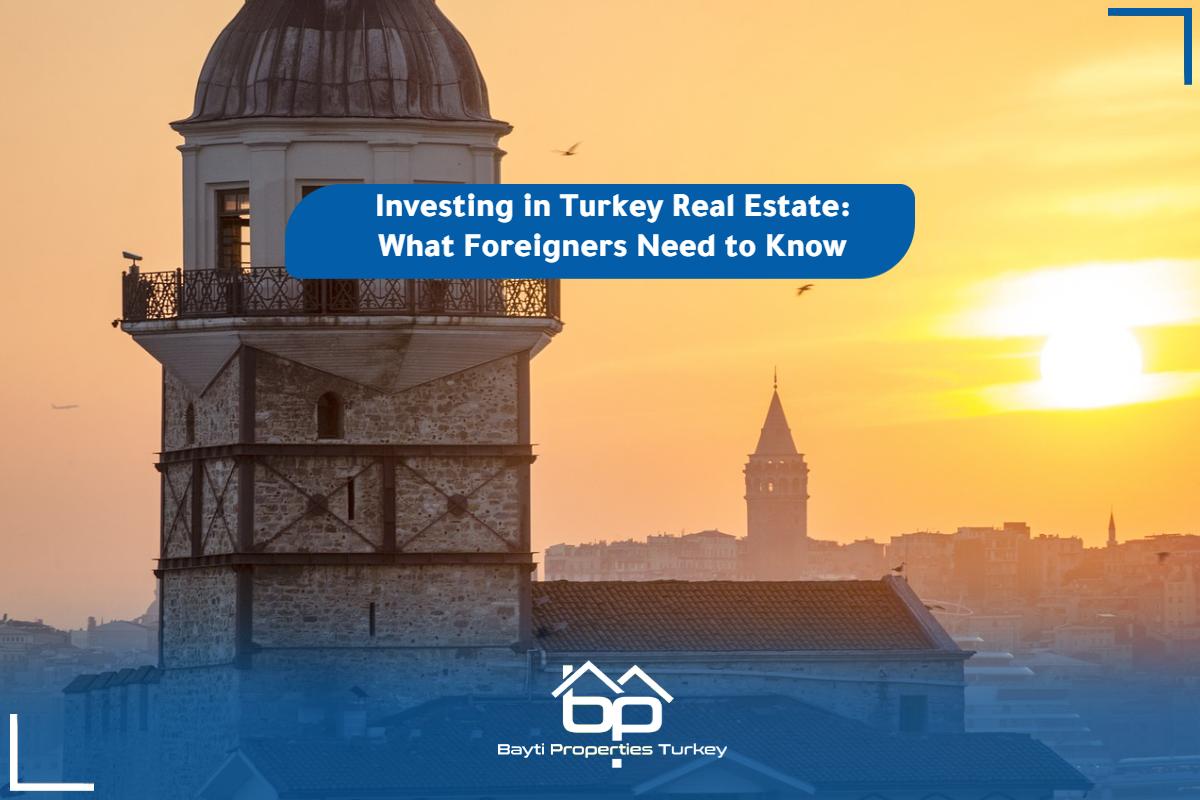Why Foreign Investment is Crucial for Turkey Real Estate Market
Turkey’s real estate market is a lucrative sector that attracts foreign investors from all around the world. The country offers a wide range of properties, from luxurious villas to modern apartments, at affordable prices compared to other European countries. As of 2021, Turkey’s real estate market has been experiencing a sustained growth period and the country’s government has been putting significant effort into promoting it as an attractive investment destination.
The Real Estate Market in Turkey
The Turkish property market has enjoyed steady growth over the last decade, which has contributed significantly to the country’s overall economic development. In recent years, many foreign investors have taken notice of opportunities in this sector and are eager to invest in Turkish properties. This growing interest has driven up demand for real estate in various regions throughout the country.
Why Foreign Investment Matters
Foreign investment is essential for Turkey’s real estate market because it enables developers and property owners to finance their projects and expand their businesses. Increased foreign investment ensures that there are more buyers in the market, which pushes up property prices and boosts investor confidence.
Moreover, international investors often bring fresh ideas and innovations that can help improve existing infrastructure and increase overall economic activity. This means more jobs will be created along with increased demand for local goods and services.
There is no disputing that foreign investment plays a critical role in any emerging market like Turkey’s real estate industry. Thus, it is crucial for both local authorities and international investors to work towards creating an environment conducive to fostering mutual trust and collaboration – this will ensure sustainable growth and development of the sector as we move forward together!
Location, Location, Location
Popular regions for foreign investment in Turkey
When it comes to investing in real estate in Turkey, foreigners certainly have their preferred locations. Istanbul, Antalya and Bodrum are consistently at the top of the list.
Istanbul is a no-brainer due to its status as the economic and cultural center of Turkey. Antalya is renowned for its pristine beaches and beautiful coastal scenery while Bodrum attracts those who enjoy a luxurious lifestyle with stunning sea views.
Factors that make these regions attractive to foreigners
The reasons behind these regions’ popularity are undeniable. Proximity to beaches and other attractions are always key considerations for any foreigner seeking a vacation home or investment property; they want a place they can enjoy without having to travel too far. Good transportation links also play an important role – no one wants to be stuck in traffic on their way to the beach or airport!
And let’s not forget the growing infrastructure; modern amenities such as shopping malls, restaurants and hospitals make life easier for those living or vacationing in these areas. Investing in real estate is all about location; it can make or break your investment.
So it’s understandable that foreigners would gravitate towards areas with known popularity for tourism and growth. In my opinion, if you’re going to invest your hard-earned money into Turkish real estate, you should definitely consider Istanbul, Antalya or Bodrum as viable options.
Legal Considerations
Overview of legal framework for foreign investors in Turkey
Foreigners investing in Turkish real estate should first understand the country’s legal framework. The Turkish government welcomes foreign investors and provides various incentives to attract them.
However, there are still certain regulations that foreigners need to abide by when investing in Turkish property. These regulations aim to protect both the local real estate market and foreign investors.
Key legal considerations for foreigners investing in Turkish real estate
One key legal consideration is property ownership restrictions and regulations, which can be complicated. For example, it is only possible for a foreign national to purchase a maximum of 30 hectares of land or property in Turkey without obtaining permission from the military authorities first.
Additionally, some properties cannot be sold to foreigners, such as those located near military zones or areas with strategic importance. Another important aspect is taxation laws and requirements.
Foreigners should familiarize themselves with taxes on purchasing real estate, such as the VAT and transfer tax, which can add up to a substantial amount of money. Taxes on renting out properties are also worth considering.
Property ownership restrictions and regulations
Foreigners must comply with various restrictions when purchasing property in Turkey. One such limit is related to military zones or strategic areas where foreigners cannot buy property without special permission from the authorities.
Additionally, there are also limitations on purchasing agricultural land by non-Turkish citizens. It’s important for potential buyers to work with experienced agents who understand these restrictions and can guide them through the process while ensuring their rights are protected.
Taxation laws and requirements
Taxes associated with buying properties can vary depending on factors like location, type of property being purchased (residential vs commercial), value of the property, etc. For instance, VAT (Value Added Tax) is charged at a rate of 18% on new properties, while transfer tax is levied at a rate of 3% – 4% of the property value.
These costs can add up significantly for buyers. Moreover, there are also taxes on renting out properties in Turkey that foreigners should be aware of.
They include income tax, property tax and stamp duty. The taxes on rental income can add up to a significant amount and reduce the overall return on investment.
Legal considerations should be taken seriously when investing in Turkish real estate. It’s important for foreign investors to understand the legal framework before making any major investment decisions as non-compliance with regulations can lead to some serious consequences such as fines or even deportation in extreme cases.
Financial Considerations
Costs associated with buying property in Turkey
Let’s face it, buying property is expensive no matter where you are in the world. However, when it comes to purchasing real estate in Turkey, there are some additional costs that foreigners need to be aware of. First of all, there is a VAT tax on new properties which can range from 1% to 18%.
In addition to this, there is also a title deed fee and stamp duty that must be paid at the time of purchase. And let’s not forget about legal fees and potential translation costs if you don’t speak Turkish fluently.
Financing options available to foreigners
When it comes to financing options for foreign investors in Turkey, things can get a bit tricky. While mortgages are available through Turkish banks and some international banks, the interest rates can be quite high compared to other countries. Additionally, Turkish banks will typically only lend up to 50-60% of the property value which means that buyers will need to have a significant amount of money saved up for a down payment.
Potential returns on investment
Now let’s get down to the nitty-gritty – potential returns on investment. As with any real estate investment, there are no guarantees when it comes to making money.
However, the Turkish real estate market has been steadily growing over the past few years which bodes well for investors looking for long-term gains. One thing that sets Turkey apart from other countries is its relatively low property prices compared with other popular destinations like Spain or Italy.
This means that investors can potentially see higher returns on their initial investment as property values continue to rise over time. But remember – investing in real estate always involves some level of risk so make sure you do your due diligence before taking the plunge!
Cultural Factors
Importance of Cultural Awareness When Investing in Turkish Real Estate
When investing in real estate in a foreign country, it’s essential to understand the culture and customs of that country. Turkey has a rich history and unique culture, which can significantly impact the buying process.
It is important to do your research and gain an understanding of the local customs, etiquette, and business practices. It will help you navigate cultural differences that may arise during the buying process and build better relationships with local agents, developers, and sellers.
How Cultural Differences Can Impact the Buying Process
Cultural differences can significantly impact the buying process when investing in Turkish real estate. For example, negotiating prices is more common in Turkey than in many other countries. However, it’s important to be respectful when haggling over prices as Turkish people value politeness and politeness goes a long way towards building solid business relationships.
Another crucial aspect is time management: In Turkey, meetings are often relaxed affairs that may start late or run over schedule. Therefore it’s essential to remain flexible as a buyer or seller because meetings might shift unexpectedly.
How to Navigate Cultural Differences When Working with Local Agents and Developers
Navigating cultural differences requires patience and open-mindedness from both parties: buyers/sellers should be open-minded about foreign cultures while agents/developers should be able to work effectively with different cultures. Effective communication is key here.
If you’re working with someone who speaks a different language than you do or if there are any misunderstandings due to cultural differences or communication barriers then make sure you resolve these issues quickly before they become bigger problems. Investing in Turkish real estate can be an excellent opportunity for foreign investors if done correctly – understanding local culture is crucial for success!
Conclusion
After conducting thorough research on the topic of foreign investment in Turkish real estate, it is clear that there are a variety of factors that play into a foreigner’s decision to invest. While location and legal considerations are certainly important, cultural factors should not be overlooked.
The Importance of Cultural Awareness
When investing in Turkish real estate as a foreigner, it is crucial to understand and respect the local culture. This includes everything from understanding the importance of family relationships and hospitality to knowing what is appropriate attire for business meetings. Failure to do so can result in misunderstandings and potential roadblocks in the buying process.
Working with Local Agents and Developers
To navigate the cultural differences and legal considerations involved in investing in Turkish real estate, it is wise for foreigners to work with local agents and developers who have experience working with international clients. These professionals can provide valuable insights into everything from financing options to negotiating prices.
An Optimistic Outlook
Despite some of the challenges involved in investing in Turkish real estate as a foreigner, there are many reasons to be optimistic about this market. Turkey’s growing economy and infrastructure make it an attractive location for investment, while its rich history and culture make it a unique place to call home. With careful consideration of all relevant factors, investing in Turkish real estate can be a rewarding experience for foreigners looking for long-term returns on their investments.


